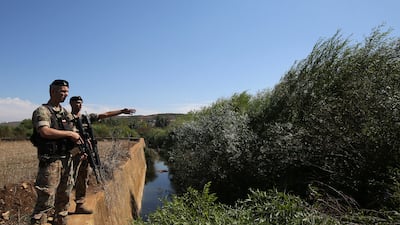Lebanese Army General Elias Aad stands atop a seemingly nondescript wall on the edge of farmland in northern Lebanon, a shallow river and bushy trees behind him.
In front of him is a patchwork of grass, water and mud, patterned with the tyre tracks made by army vehicles crisscrossing the land.
The wall, less than a metre high in some places, is easy to climb on to – but it represents much more than its height.
A visual representation of the latest furore in Lebanon over the status of Syrians in the country, its marks the land border between the two countries.
Controversy over Syrians in Lebanon is not new, but Lebanese authorities say the number has increased in recent months. Now politicians who claim there are more than two million Syrians in the country have upped the ante over the situation, demanding a resolution.
"We saw a danger in the number of people who are crossing the border illegally. So because we are responsible for the security and safety of the population and community, and when we saw something that maybe is a future danger, we must alert everyone," General Aad told The National during a media tour of the border area.
It is impossible to know exactly the number of Syrians in Lebanon, but Gen Aad said the Lebanese Army arrested 8,000 people in August and 4,500 in September.
"It's not small numbers. This is why it is our duty and responsibility to alert everyone that this is what's happening on the border," he added.
Authorities say Lebanon, entrenched in one of the worst economic crises in modern history, is unable to cope with the number of Syrians. Some talk of an existential demographic threat to Lebanon, increasing tensions and the controversy further.

In Syria, the economic situation is at the worst point since the civil war began, meaning many who stayed have tried to leave, whether by land or by sea.
Many of the Syrians are refugees who fled the 12-year civil war in Syria, but Lebanon now says that Syria is safe to return although the UN and rights groups strongly disagree.
Razi El Hage, an MP for parliament's largest party, the Lebanese Forces, said it was dangerous to hear talk from the international community that now was not the right time for Syrians to return or be resettled elsewhere.
"We are asking the international community to help Lebanon in keeping the Syrian issue in the right way and the legal way. Because Lebanon cannot accept this huge presence," Mr El Hage said.
"This presence is highly dangerous because it puts pressure on all levels, economic, social and security. It's becoming a national issue."
Many also privately talk about underlying resentment from the "humiliating" Syrian occupation of Lebanon during and after the 1975-1990 Lebanese Civil War.
During a presentation, the Lebanese Army displayed videos and images of apparently elaborate ways that Syrians had sought to enter Lebanon. Officers said they had insufficient manpower, equipment or resources to properly deal with illegal entries, pointing to the fact that a sole regiment was responsible for tending to a 120km border.
Some politicians The National spoke to say about 80 per cent of people enter the country illegally. They said the number of Syrians in Lebanon had been bolstered by those born in Lebanon and those who had not returned to Syria.
The government has also increased the pressure and rhetoric with Interior Minister Bassem Mawlawi claiming this week that 30 per cent of crimes in Lebanon were committed by Syrians.
Hassan Nasrallah, the leader of Hezbollah – a key ally of the Syrian government – said this week "that the refugee file constitutes an existential threat to Lebanon", while calling for statistics that "distinguish between the workforce and refugees".

Mr Nasrallah, like others, also lashed out at the UN's refugee agency (UNHCR), who they accuse of facilitating the presence of Syrians in Lebanon. The issue has largely united Lebanon's divided political scene. The Lebanese Forces, a Christian-led party, is deeply opposed to Hezbollah, the Iran-backed armed group and political faction.
"The Lebanese Forces are saying clearly that this presence is illegal, because when Syrians came in 2011, there was a war in Syria," Mr El Hage told The National.
"And for that reason, we opened the borders and we said that we need to have a public policy about what we will do with all the refugees that are coming from Syria at that time. The government didn't take any action."
Mr El Hage insisted it was not a political or religious issue.
"Proportionally, we cannot have about 40 per cent of the Lebanese residents being Syrians. We are just saying Lebanon cannot any more accept more than two million Syrians. We cannot accept the burden on the economy, infrastructure and its social issues.
"We need urgent support form the international community to support Lebanon in what we are facing."
It has also led to increased tensions in communities, with some Syrians attacked or abused. Some politicians have seized on this, warning that a small spark could lead to something bigger.
Back on the border, General Aad claimed that most of the people crossing were young people, with an average age between 18 and 26.
"This is something really that must be taken into consideration," he said. "We can say that sometimes you have women and children, but the majority are young people.
"When you have a big number of young people coming, you must be aware of what they are doing, where they are going, what type of activities they are doing."


